Armenian eco-terror in Karabakh constitute serious threat to peace and security in region - opinion

By Trend
The Nagorno-Karabakh region’s ecosystem, wildlife, and natural resources have been badly damaged by the conflict between Armenia and Azerbaijan, Naghi Ahmadov, a Senior Fellow at the Center of Analysis of International Relations (AIR Center) wrote in an article to Euractiv, Trend reports.
In an article named “The environmental cost of conflict”, the author writes that on 9 November, the leaders of Azerbaijan and Armenia signed a Russia-brokered agreement to end the military operations in Karabakh that had started on 27 September and while the peace deal guaranteed Azerbaijan’s victory and was thus a cause for great celebration in Azerbaijan, Armenians reacted with fury and deep frustration.
“Despite the fact that the Armenians moved to these Azerbaijani regions only after their occupation in the war of the early 1990s, they found it unacceptable to hand those territories back to Azerbaijanis. Media reports showed Armenians in Kalbajar burning houses, cutting down trees, and setting fire to forests before they left the region. It has been reported that they did not shy away from burning down schools and hospitals and butchering the cattle. Unfortunately, these acts have not received an adequate reaction from the international institutions and NGOs that deal with environmental issues,” the report said.
The author noted that all these unlawful acts need to be strongly condemned: “Unfortunately, this environmental terror against the occupied regions of Azerbaijan started at the very beginning of the occupation. The region’s ecosystem, wildlife, and natural resources have been violently destroyed over the last 27 years.”
The author also notes it is worth noting that the total forest area under occupation was 247,352 hectares; about 13,197 hectares of these are of particular importance: “More than 460 wild plants and shrubs grow in these forested areas. Of these, 70 are endemic and do not grow naturally anywhere else in the world. In the Kalbajar region, 968 hectares of trees included on the IUCN Red List were also cut down and sold abroad.”
To put it briefly, the author said, as a consequence of the occupation, Nagorno-Karabakh has experienced massive destruction of the ecosystem that can be characterized as “ecocide,” which calls for assigning criminal responsibility.
“As a result of the liberation of the territories from occupation, Azerbaijan has discovered new incidences of environmental terror carried out by the Armenians on these lands for almost 30 years. In order to ascertain the true condition of the flora and fauna of the liberated territories, it is necessary to conduct an appropriate investigation and objective scientific assessments on the spot and determine the damage caused to nature,” the author said.
“To sum up, the [Armenian] hostile attitude toward nature and the eco-terror in Nagorno-Karabakh and the adjacent regions of Azerbaijan not only pose a serious threat to the ecological balance, flora and fauna of Azerbaijan but also, along with other provocative actions, instill further hatred and constitute a serious threat to peace and security in the region,” the author said.
--
Follow us on Twitter @AzerNewsAz
Here we are to serve you with news right now. It does not cost much, but worth your attention.
Choose to support open, independent, quality journalism and subscribe on a monthly basis.
By subscribing to our online newspaper, you can have full digital access to all news, analysis, and much more.
You can also follow AzerNEWS on Twitter @AzerNewsAz or Facebook @AzerNewsNewspaper
Thank you!
